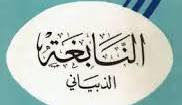Nabigha Dhubyani, name – Ziyad ibn Muawiyya (6th and 7th centuries) was an Arabian poet, who was one of the last poets of pre-Islamic times. His tribe, the Bani Dhubyan hailed from an area near Mecca. However, he himself passed most of his time at the courts of Hira and Ghassan. In Hira he eulogized Mundhir III and his successor in 562. After a sojourn at the court of Ghassan, he returned to Hira under Numan. Nevertheless, he was compelled to flee to Ghassan, because of some verses he had composed describing the queen in a fine style, but returned again about 600. When Numan died some five years later he withdrew to his own tribe. The date of his death is uncertain, but he does not seem to have known Islam.
His poems consist largely of eulogies and satires, and are concerned with struggles between Hira and Ghassan, and of the Bani Abs and the Bani Dhubyan. He is one of the six eminent pre-Islamic poets whose poems were collected before the middle of the 2nd century of Islam, and have been regarded as the standard of Arabian poetry. Some writers consider him the first of the six.
Anecdotes of Nabigha & Numan
Nabigha would lavishly praise Numan and in turn Numan was exceedingly generous for his court poet and the legend has it that there were many persons who did not like as our genius poet had become a millionaire in the contemporary parlance eating in utensils made of gold and silver. Resultantly, animosity arose between these two friends because of enemies. There are many anecdotes about this unanimous reality among the critics and literary scholars.
First Anecdote:
First anecdote narrates that the jealous persons fabricated an Arabic ode in the style of Nabigha lampooning Numan satirizing him that his mother is born to a daughter of goldsmith from Fadak and the king of Hirah himself is ignorant, coward. He is a man who is harmful to dear ones and does nothing to those who are at distance. The ruler is unfaithful to his friend. He does arrange an army of thousands but he is unable even to touch an enemy. They say when Numan heard this qasidah he began burning with rage and warned to kill Nabigha.
Second Anecdote:
The second anecdote is told by the biographers regarding the annoyance of Numan with Nabigha that once Numan asked Nabigha in ecstasy in the night he should describe the features of his wife Mutajarridah. Interestingly, Nabigha had a chance to glance on her and when he had stared at her, she blushed hiding her face in hurry with her white hands decorated by henna. This spontaneous act of blushing impressed the poet inciting his intuition of poesy and when he got the opportunity, he described in so fine imagery and lucid diction describing her body parts, eyes and others that it was not a combination of words but a pure sculpture made by words. The husband liked the beauty description of his but as it has been the tradition in the realm of rivalries, the rival poet Munkhal al-Yushkari, lover of Mutajarridah as per some accounts, turned the tide against Nabigha arguing that it must be the description of a person, who has experienced it. It was like an arrow into his heart and Numan became so angry with Nabigha that he warned to kill him and Nabigha fled to Ghassan kings in Syria.
Third Anecdote:
The third anecdote is that Nabigha had a valuable sword. Numan happened to see and liked it. He asked it from Nabigha but he denied paving the way for the jealous inciting Numan against Nabigha and who in turn disliked it warning to kill him, which resulted in fleeing away of Nabigha to the kings of Ghassan.
These are merely anecdotes not supported by reliable historical evidence but they may be true in full or in part and it is also likelihood that they are bare fabrications by the literary fabricators.
Hamid Siddiqui
Director: MOI – Portal







Leave a Reply